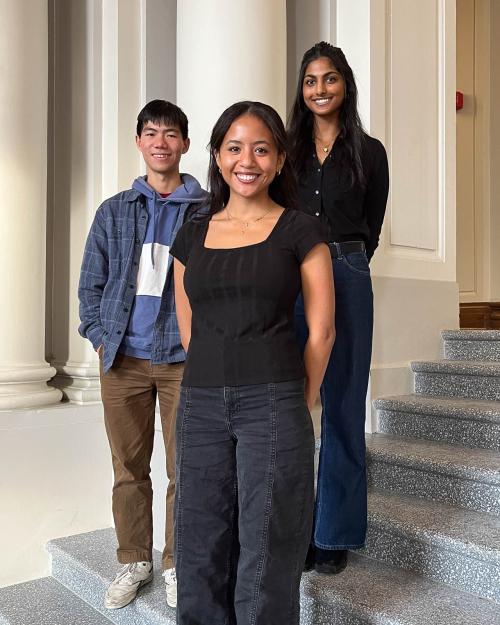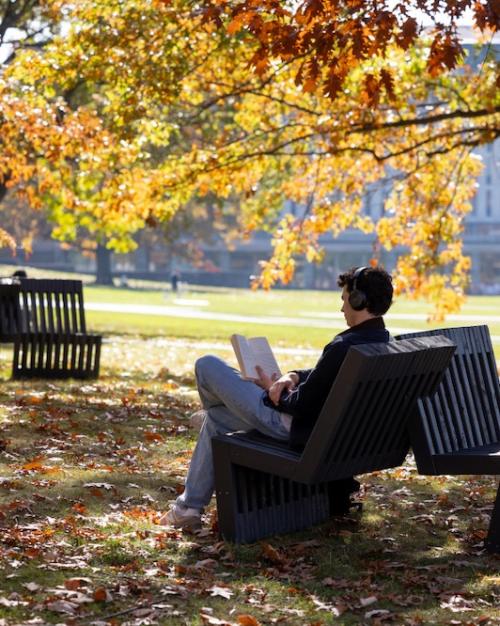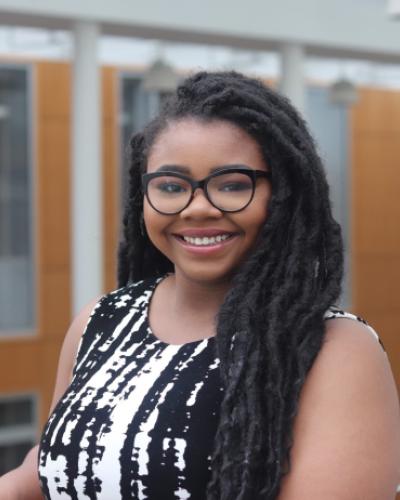The Student Spotlight feature is intended to showcase the diverse range of interests among students majoring in Economics. Amina Kilpatrick, a rising senior majoring in both Economics and Government, is Co-President of the Black Women’s Support Network at Cornell, an organization that focuses on the social lives and well-being of Black women at Cornell. The Black Women’s Support Network recently raised about $5,000 for local protests in Ithaca against police brutality. The group, along with nearly 300 other Cornell student organizations, also signed on to support Cornell Students for Black Lives (C4BL) in its mission to “amplify Black voices in the Cornell community and promote education and activism to end explicit and implicit racism” and in its initiative to raise funds for five national and local organizations: Black Lives Matter of Greater New York, Communities United for Police Reform, NAACP Legal Defense and Educational Fund, Southside Community Center, and Tompkins County Showing Up for Racial Justice. Amina, along with many other students at Cornell, quickly harnessed the power of social media to raise funds, and as a result, Cornell Students for Black Lives has raised over $118,000 in the past month.
How did you decide to major in Economics and Government?
I decided to double major because I love the quantitative and analytical skills along with the chance to apply those skills to real world issues that Economics is giving me, as well as the chance to study topics I’m really passionate about in the Government major, like inequality, poverty, and mass incarceration.
As you were making these decisions about your studies, what kinds of student organizations did you get involved in, and how did you become involved with Cornell Students for Black Lives?
For my first two years, I was heavily involved in the Cornell International Affairs Society, and I became the secretary general for the conference they ran in China, so I went to China for two weeks and ran a Model United Nations conference. I was also a news editor for the Cornell Daily Sun. I became involved with Cornell Students for Black Lives when they reached out to me in my capacity as co-President for the Black Women’s Support Network at Cornell, and I believed in their mission and felt comfortable supporting them both on behalf of my organization and on a personal level.
Now that Cornell Students for Black Lives’ fundraiser has closed, can you tell me what its next initiative might be?
Phase two will focus on long-term solutions and will involve lots of education and advocacy and will formalize guidelines for organizations who wish to remain a part of Cornell Students for Black Lives Matter.
Are there concepts you’ve learned about in your economics or government classes that help explain the persistence of systemic racism?
In Government I’m taking classes that address systemic racism directly. For example, a class I took with Professor Jamila Michener, The Politics of Poverty, examines issues such as Black people being denied access to housing loans, and in turn how they had to take bad loans, and then defaulted on them, which contributes to generational poverty. I’m also taking classes on mass incarceration that are relevant as we’re thinking critically about policing and how modern-day policing has roots in slave patrols, and about how the 13th Amendment says slavery and involuntary servitude are abolished except as a punishment for a crime. On the other hand, Economics has helped me think long-term of both aggregate solutions as well as short-term solutions. I’m really excited to take a class next year called “The Economics of Crime.” Overall, Economics has helped me understand a lot of the Government readings that I’ve been doing. For example, taking ECON 3120 Applied Econometrics has really helped me understand how the models in the readings were constructed. And having an economist’s perspective on what’s going on when I’m reading about the carceral state has been really helpful.
What kinds of careers are you interested in?
I’m a member of the Black Ivy Pre-Law Society, and we’ve done a few law school tours, and we even visited the ACLU. I do want to go to law-school at some point. A dream organization I’d like to work for would be something like the ACLU, that does class-action law suits. The protests and uprisings that have been going on are making me think about the importance of being a defense attorney; the system isn’t always just, especially for poor people, so I’d like to help them in some way… I’m even thinking about politics; with the pandemic, I’m seeing the importance of having leaders who care at every single level of government. Even if it’s just the mayor or just a city council—it’s the city councils in places like Minneapolis that are proposing to defund the police.
A lot of students in Economics end up going into finance, and many students have the impression that that’s the main career trajectory for Economics majors. But do you think the Economics major can also be a good fit for someone who is more civic-minded?
I mean, personally, I want to understand the system even if I want to dismantle it or make changes to it. It’s important to understand how economic systems are working so that if you, for example, want to help people who are exploited by bad loans, you need to understand how and why these loans were even possible in our system. Economics can help you understand how policies were created in terms of cost-benefit analysis. And there are classes in Economics that aren’t even directly applicable to finance. This semester I took Behavioral Economics with Professor O'Donaghue, and I felt like it was relevant for all aspects of life! It made me think of life in terms of little decisions. Economics makes assumptions that people just want to maximize utility, or avoid risk, but there’s also time constraints and other kinds of considerations that go into decision-making. Whatever I end up doing, I know I want to make change on a large scale, so it’s important to understand human behavior.
Diversity at Cornell and in the Economics major can be an issue; it’s hard to go into a classroom where nobody looks like you, and I don’t think it should be on the students to make a space for themselves; it’s definitely a responsibility of the administration and the faculty to make sure they create an inclusive space. Personally, I’m interested in a lot of social justice issues, so the classes I want to take in the Economics Department are things like Economic Analysis of the University, Economics, Health, and Inequality, Economics and Women. Having more classes like that on the roster are a way to signal that there is a place for people with interests beyond finance.
Do you have any advice for students?
I think joining the College of Arts & Sciences was a great decision because it prioritizes exploration. In terms of getting involved beyond classes, something like Cornell Students for Black Lives was started simply by someone who saw a problem and reached out to a friend, and their friend’s friends, and eventually created this whole entire network. So don’t think that anything is ever too big of a problem, just start with what you know, and start talking about your ideas with friends.





